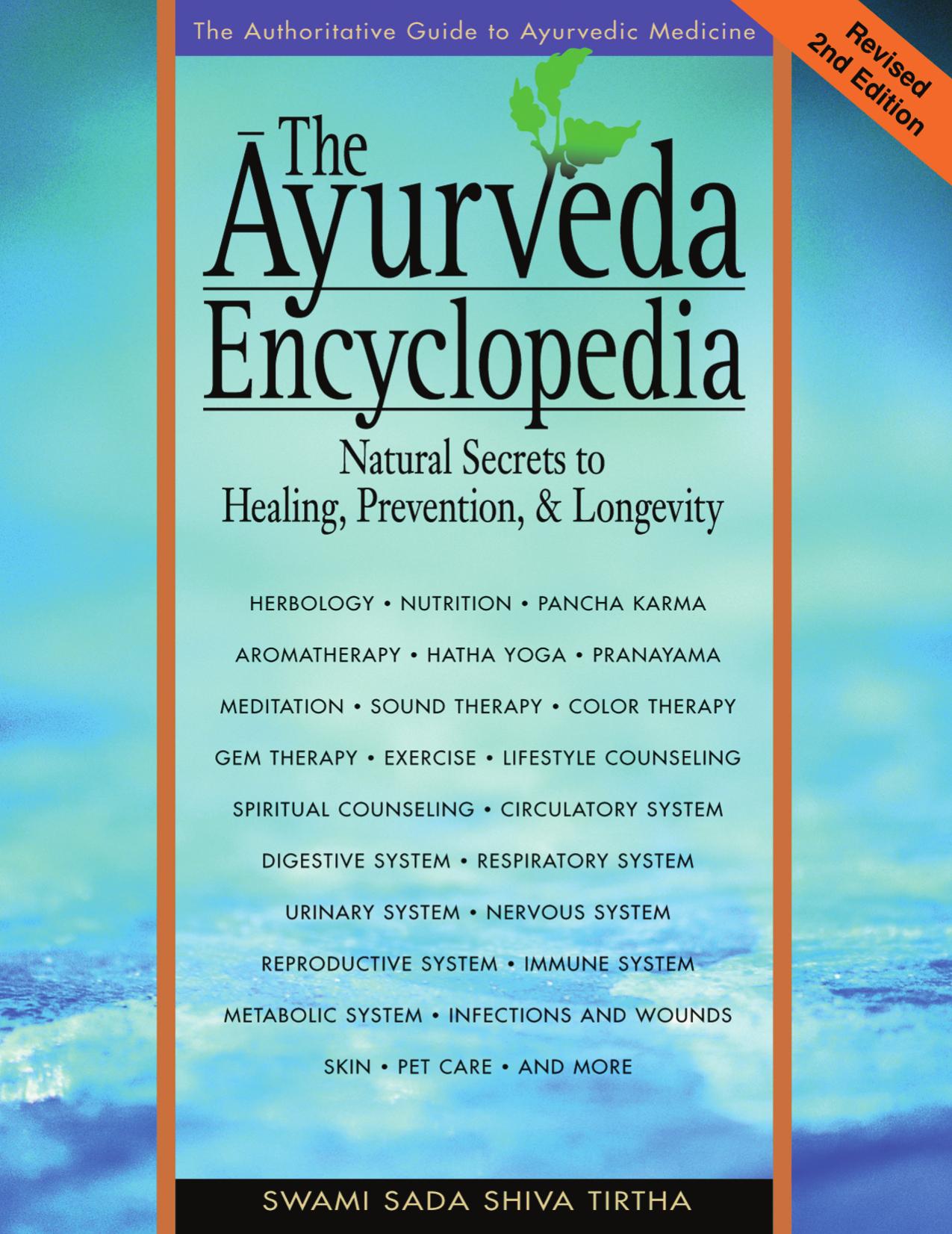The Ayurveda Encyclopedia by Swami Sadashiva Tirtha

Author:Swami Sadashiva Tirtha
Language: eng
Format: epub, pdf
Publisher: Independent Publishers Group
Published: 2007-09-01T04:00:00+00:00
In all of life’s activities, one should adopt
the middle course; avoid extremes.
Ahóñga : S. Ch. 2; ver. 30
Chapter 13
yurvedic Psychology, Ethics
and Spiritual Counseling
hen reading the original texts (i.e., Charak , Suhrut , Ahóhñga ), one sees that is truly a complete, or holistic, science. In these ancient writings, insights into the science of mind and body were seen as interdependent, and a complete system of psychological healing was laid out.
In Chapter 12, we discussed the role of the environment as one of several factors in creating imbalances. This also includes the external mental or psychological environment. Practically speaking, when a person cannot find any internal or physical causes for an illness, suggests looking to other factors (both mental and physical): for example, lifestyle plays a vital role in a balanced or healthy life. Environmental changes can balance a person as much as herbs, aromas, or other factors. emphasizes the natural restoration and development of harmony and health, in the home and surroundings. People are advised to do the following:
• Take in positive impressions.
• Release negative emotions (i.e., do not suppress them).
• Maintain and develop positive self-worth and self-esteem.
• Remember that the goal of life is Divine God
Home:
• Insure surroundings of beauty and harmony.
• Gain rest and happiness.
• Use full-spectrum light bulbs in the winter if suffering from depression.
• Make your dwelling, or at least some part of it, into a temple of sacred healing.
• Prepare an altar with photos of saints, sages, deities, sacred objects, statures, gems, yan-tras, incense, flowers, belts, and the like (according to your faith). When you use this space only for meditation and chanting, it will grow in the energy of spiritual peace.
Nature:
• Daily walks renew, revive, and refresh.
• Take hikes and nature walks; go camping.
• Visiting oceans, streams, waterfalls, and other natural bodies of water.
• Visit public gardens, or till and plant your own garden (with waterfall and pond if possible).
• Get adequate sun and fresh air daily.
Dohas and the Environment
Vyu: Gains rest, relaxation, stability, peace and security from the environment.
Pitta: Needs relaxation, recreation, amusement, beauty, affection, and delight.
Kapha: Needs exercise, work, stimulation, motivation, exertion.
Love and Emotions
Full consciousness, or mokha, when a person is centered within themselves, there is a feeling that Mother Nature will provide all of one’s essential needs, food, shelter, peace, contentment, grace, and Divinity. This faith in her will constantly grow. Faith emanates from within the individual, is automatically experienced, and is shared with others.
Faith or Divine love can be cultivated through sdhan (meditation), proper diet, aromas, music, massage, yoga, and other therapies. These spiritual and healing methods allow persons to actively take positive control of their lives, clear their emotions, and enlarge their inner Divinity. These modalities help persons of different dohas in specific ways:
Vyu: Releases fear and anxiety, and develops peace, faith, and courage.
Pitta: Releases anger, resentment, impatience, and develops love, compassion, and forgiveness.
Kapha: Releases greed, attachment, clinging, lethargy, and develops clarity and detachment from these emotions.
Developing Self-Worth
In the book Yoga Vani; Instructions for the Attainment of Siddhayoga, Vedic advice is offered for developing one’s self-esteem.
Download
The Ayurveda Encyclopedia by Swami Sadashiva Tirtha.pdf
This site does not store any files on its server. We only index and link to content provided by other sites. Please contact the content providers to delete copyright contents if any and email us, we'll remove relevant links or contents immediately.
Becoming Supernatural by Dr. Joe Dispenza(7103)
Tools of Titans by Timothy Ferriss(6945)
The Witchcraft of Salem Village by Shirley Jackson(6582)
Inner Engineering: A Yogi's Guide to Joy by Sadhguru(5893)
The Four Agreements by Don Miguel Ruiz(5510)
The Power of Now: A Guide to Spiritual Enlightenment by Eckhart Tolle(4752)
The Wisdom of Sundays by Oprah Winfrey(4626)
Room 212 by Kate Stewart(4102)
Fear by Osho(4084)
Pale Blue Dot by Carl Sagan(4001)
The David Icke Guide to the Global Conspiracy (and how to end it) by David Icke(3881)
Rising Strong by Brene Brown(3780)
Animal Frequency by Melissa Alvarez(3753)
How to Change Your Mind by Michael Pollan(3673)
Sigil Witchery by Laura Tempest Zakroff(3651)
Real Magic by Dean Radin PhD(3567)
Secrets of Antigravity Propulsion: Tesla, UFOs, and Classified Aerospace Technology by Ph.D. Paul A. Laviolette(3443)
The Art of Happiness by The Dalai Lama(3382)
Man and His Symbols by Carl Gustav Jung(3315)
